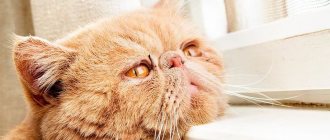Sexual instincts
Different in males and females. But they also have many similarities.
Cats
Females demonstrate their readiness to mate by behavior and attract males.
The cat's behavior is characterized by the following signs:
- refusal of food;
- frequent visits to the toilet;
- often urinates in places other than the potty;
- constant licking of the intimate area;
- rolling on the floor;
- frequent screams;
- swollen vulva.
Cats
In many ways the behavior is similar, but there are a few differences:
- refuse food;
- doing business in the wrong places;
- urine acquires a pungent, unpleasant odor;
- urinate on vertical objects;
- constantly howl for a long time.
Solution
An option is to regularly let your pet outside.
But the solution has a lot of disadvantages:
- cats will become pregnant as a result of binge drinking;
- both sexes will not stop behaving badly, will continue to mark the territory until the sexual hunt passes;
- cats will definitely fight, and as a result they will end up without an ear or an eye;
- the pet may get lost and not find the way back;
- They often catch worms and always come back with fleas.
The second option is the use of hormonal agents, due to which the animal will stop suffering. But this will lead to the development of tumors. So the only correct, truly humane way to solve the problem is castration, sterilization. These surgeries are simple and performed frequently, so the techniques are refined.
How to stop a cat from chewing wires
Weaning a kitten from a pathological sucking reflex
Tray training a kitten
The operation is completed in half an hour. Pets are injected with anesthesia into the bloodstream to numb and immobilize the animal. Castration and sterilization takes place quickly. The cat comes to his senses within a few hours. To prevent the pet from licking the surgical field, wearing a collar is prescribed.
High level of anxiety
If the kitten you chose lived in poor conditions before you, for example, the owners took poor care of it or it grew up on the street, constant meowing may signal a high level of anxiety. To wean a restless animal from constantly meowing, you should pet it more often, set aside a corner in the apartment where the kitten can be alone and calm down, and do not shout at the animal, which cannot find a place for itself due to excitement. Only affection and attention will help the cat get used to new conditions: in this case, the reason that makes the animal yell will be eliminated.
Urolithiasis (UCD)
This is a common pathology among cats. Cats suffer from it relatively rarely. Males are predisposed due to the structural features of the urethra. Firstly, it is too narrow, and secondly, it is tortuous. With urolithiasis, stones and sand form in the bladder. The former cause irritation and take up extra space. The latter clog the urethra, complicating the outflow of fluid.
Important! The result of ICD is a ruptured bladder, the painful death of a cat .
Causes of urolithiasis: poor diet, lack of vitamins, obesity, metabolic disorders. As a result, the acidity of the urine changes, due to which elements (salts or, conversely, proteins) begin to quickly precipitate. As a result, sand and stones are formed, which cause urolithiasis.
Symptoms of urolithiasis:
- the cat tries to go to the toilet a little at a time, but he can’t defecate;
- an important symptom is the pot is dry;
- urine is concentrated, amber-yellow, with a pungent odor;
- constant licking of the groin area;
- there is blood in the urine;
- the pet is lethargic and refuses food;
- body temperature rises;
- palpation of the abdomen reveals a distended bladder;
- X-ray shows stones in the bladder area.
Solution
First of all, you need to visit a veterinarian so that the doctor chooses and prescribes a treatment method. To remove urine through surgery, a catheter is inserted for several days, and a collar is also put on to prevent the cat from licking the perineum.
To resolve urinary stones, a diet is prescribed. Special food is purchased at pet stores. There are veterinary products that should be used separately for oxalate or struvite stones. It rarely happens that stones are removed by surgery.
Anti-inflammatory drugs, painkillers, and diuretics are also prescribed. The veterinarian prescribes pharmaceutical preparations of medicinal herbs. It is necessary to understand that the pathology returns if the cause is not eliminated. Therefore, a diet is prescribed, and the cat must also be walked so that it moves.
The cat screams at night
Cats tend to be active at night, as in the wild they begin to hunt at sunset. Thanks to the special structure of their eyes, cats see perfectly in the dark and are considered universal night hunters.
One of the most common reasons why a cat cries at night is a lack of physical activity during the day. If your pet sleeps all day, interrupted by eating and going to the litter box, there is nothing he can do to stay healthy except to be active at night.
Most cats, even those that receive adequate exercise, exhibit short periods of activity during the dark hours.
Usually the activity lasts 10–15 minutes, but during this time the cat actively runs, sharpens its claws, screams, and behaves defiantly. After a burst of activity, the pet calmly goes to the lounger and falls asleep for the whole night. If the cat does not receive adequate exercise during the day, bursts of activity can last for hours.
Is the cat screaming for no reason?
If you are sure that your pet is getting enough exercise and is screaming for no reason, contact your veterinarian before jumping to conclusions. Night cries may be associated with latently developing diseases.
The most common disease, the first symptom of which is the heart-rending cry of a cat, is urolithiasis. With urolithiasis, urine accumulates in the bladder and cannot exit through the urethra because it is blocked by sand or stone. Trying to empty the bladder, the cat experiences acute pain, as a result of which it screams.
Urolithiasis may be indicated by:
- Ignoring the tray.
- General malaise.
- Increase in base body temperature.
- Apathy.
- Inflammation of the external genital organs.
- Small amount of urine during bowel movements.
- Presence of blood in the urine.
If your cat only cries at night, it is likely that she is reacting to stimuli that she does not hear during the day. The pet may hear the movement of rodents under the floor or in the walls, the crackling of electrical wiring, suspicious sounds from neighboring apartments or from behind the front door.
What to do if a cat is yelling under the bedroom door?
Many owners prefer to sleep with cats, but when trying to train their pet to sleep on a bed, they encounter a number of behavioral problems. A heart-rending scream under your bedroom door is nothing more than a test of your nerves' strength.
Interesting! If you decide to change your routine in one day, without preparation, because you wanted to, a panicked and hysterical reaction from your pet is quite expected.
If you decide to accustom your cat to a bed, act progressively. For the first few nights, place the bed in the bedroom as this will be more familiar to the cat. Only after the pet has come to terms with sleeping on a lounger within the bedroom can you try to move it to another room.
Eating behavior
Pets often start screaming at 5-6 in the morning to be fed, and they also become indignant and fight if feeding time is delayed. An animal can cause a scandal when it is given the wrong product for hunting. Other reasons are possible (requires treats, impaired hunger).
Solution
In any case, you need to behave the same:
- Animals should not be allowed into the kitchen during food preparation or human meals;
- throwing, screaming, scratching must be ignored;
- if you refuse food, you cannot exchange it for a treat;
- the treat should not serve as food, it is given to the pet during training;
- the treat is given on a full stomach;
- do not show any reaction to your pet’s howls;
- food intake must be regulated and adhere to an hourly schedule;
- if the pet begins to behave violently, it can be locked in a separate room (toilet) and placed on the landing.
The main reasons for loud meowing
Meowing in the presence of a person, the cat is trying to convey some information to the owner. Let's list the most common reasons why cats meow loudly.
- Greeting a person.
- To attract attention. A call to play, a request for affection.
- Hunger or thirst.
- Please open the door.
- Illness, discomfort, pain.
- Stress, fear.
- Loneliness.
- Cognitive impairment (in aging cats).
- Sexual desire, partner's call.
- Deafness
- Nocturnal lifestyle.
Some causes of cat crying require serious attention and quick response from the owners.
Video
High activity at night
Cats are nocturnal animals. Therefore, when the sun sets, they begin to run around the apartment, play wildly, drop objects, meow, howl, and demand feeding. It is a completely natural behavior that is present to a greater or lesser extent in all cats.
Solution
There are 2 possible strategies:
- Drive the cat out into the street, onto the landing, into the room at night, outside the door. Let him seek adventure if he wants. Some owners do this. Their pets constantly walk at night and during the day, hunt pigeons, fight with cats, and run from dogs.
- Accustom your pet to a daily lifestyle. To do this you need to play with him. Use laser pointers, jingling balls, radio-controlled cars, mice, and teasers. This is purchased at a veterinary pet store. Owners also walk their pet on a leash during the day. Of course, in the evening the toys and bells are removed and the scratching post is left behind.
How he yells in the morning - reasons
A cat's heart-rending cry in the morning most often indicates hunger. Again, you should contact your veterinarian before jumping to any conclusions. Older cats often experience severe pain in the morning when their joints become stiff. Urolithiasis can also cause attacks of acute pain in the morning when the cat wants to empty its bladder.
Important! In fact, there are a lot of physiological problems that can make a cat scream heart-rendingly and only a veterinarian can differentiate them.
How to stop a cat from yelling and demanding food?
If your pet is used to yelling and demanding food, it will not be easy to correct its behavior. The best method of dealing with the problem is prevention. As soon as you notice unwanted behavior, exclude your pet from the kitchen until you have filled the bowl and placed it in its usual place.
If the cat is used to actively asking for food, carefully review its diet; perhaps the pet constantly feels hungry. Even with a sufficient amount of food, the feeling of obsessive hunger can be associated with vitamin deficiency, metabolic disorders or mineral deficiency.
After feeding your pet, be sure to take it out of the kitchen if you are going to eat. Close the door to the kitchen and ignore the screams. The cat must accept that your food is untouchable, since you are the leader of the “pride”. It is in your best interest not to encourage begging and not to feed your pet from the table, even if he really asks.
Boredom, loneliness
At night, pets get used to sleeping next to their owner; when separated, they do not fall asleep, ask to go to bed, and become active. During the day, an animal in an apartment may be openly bored, meowing from boredom, asking to be played with, dropping and scratching objects.
Solution
To prevent your pet from getting bored, create a corner for him to play and have fun. There you need to put a scratching post, hammocks, hang bells, balls, teasers. Toys need to be updated periodically; the animal gets used to them. The owners also keep fish in a closed aquarium and small parrots. It’s better to play with the cat with mice and radio-controlled cars yourself, and start training it.
The problem of loneliness can be solved by leaving the doors to the bedroom open and making a hole so that the cat can walk back and forth freely. If you need to wean your pet from sleeping with its owner, first make a bed, train it with mint, and then move it to the right place.
Why does the cat constantly yell?
Why does the cat constantly yell? Determining the causes of destructive behavior is the best method for solving the problem. Eliminating the cause of irritation is much easier than changing your pet's habits.
Let us immediately note that there are three main reasons for constant yelling:
- Instincts.
- Physiology.
- Psychology.
Instincts cannot be changed through education; you need to come to terms with this right away. Physiological reasons are most often accompanied by discomfort, which the cat expresses by meowing. Psychological problems are always accompanied by stress, which can provoke both behavioral and physiological problems. Let's take a closer look.
Signs of aggression in cats
Before “going berserk,” your pet gives clear signals about an upcoming burst of aggression. How to determine that an animal is preparing to attack:
- angry grin;
- growling and hissing;
- mustaches and ears are pressed down;
- dilated pupils;
- wool standing on end;
- a crooked, awkward pose;
- looking directly at the target or clearly avoiding eye contact.
Cry from the heart
The cat looks angry, irritated, on edge, as if he is unable to relax, and explodes at the slightest provocation. Almost anything can provoke such a release of negativity - from the fright of an awakened animal to serious changes in the environment or place of residence. For example, it is almost guaranteed that a cat will “go mad” when there are a large number of strangers, the appearance of a new pet, or when moving frequently.
Aggression can be intraspecific (cat-cat) and interspecific (cat-another animal, cat-human). Also, sometimes the pet attacks and tears objects.
Sometimes the pet attacks and tears objects
The condition can appear suddenly and plunge the living object of attack into psychological shock - the same as the one in which the cat itself is.
Animal psychologists say: signs of aggression in cats very often mask fear and severe stress in which the animal itself is. The cat wants to, but cannot find a way out of the situation and understand it. He can be helped by simply understanding what led to the aggression.
Hormonal changes
They occur at different points in the life of pussies:
- During mating, they can use a cry to signal their partner about their passionate desires.
- Cats that have not been spayed may scream during heat. In this way they show their difficult moral state on the eve of the birth of offspring.
- The same situation can be observed with non-neutered cats.
In the case of changes in the pet's hormonal levels, the owners can only survive this difficult period in his life, calming emotional outbursts.
How not to behave
Of course, when it seems that you have taken all the measures - fed, watered, caressed, survived the sterilization period, and the cat still screams at night, then even the calmest owner will lose his nerve. But under no circumstances should you use violent measures against an animal or shout at it.
After all, a cat is a very smart creature; it has a sense of revenge. And how she will take revenge is unknown.
In addition, cats are also proud animals, they will not tolerate any violence against themselves, it is impossible to achieve anything with the help of force, you just need to try to show patience and attention. Only in this case is it possible to obtain a positive result.
Often cats have a peculiarity: they can start yelling for no reason at any time of the day. The cries of a neutered pet that does not suffer from any disease are perceived especially strange by the owners.
To begin with, it is worth understanding that during the period of heat, all unsterilized cats scream, the same goes for unneutered cats. This is an absolutely normal phenomenon, and it is possible to get rid of it only by allowing the pet to embody its natural instincts. You can choose a suitable partner for him or carry out the appropriate operation. By the way, this operation requires not only financial investments, but also special care for the animal in the next 3 days.
If we are talking about a sterilized cat or a neutered cat, then you need to pay special attention to the screams of such pets; they can be caused by various reasons
.
Folk remedies for fighting orom
The nightly concerts of pets get on the nerves so much that their owners, despairing of finding a radical remedy, are finding their own ways to calm the “singers”:
- Spray bottle with water . It has been noticed that if you specifically spray water on a cat’s tail, its owner will have no time for songs. For some time he will be busy licking his main decoration and will calm down for a while. If after this he starts yelling again, threaten him with a spray gun. Most likely, the cat will hide in a secluded shelter and soon fall asleep.
- A game. If your pet is not in nature and is forced to spend all his time within four walls, he has no way to relieve excess energy. Outdoor games can help with this - only, of course, not at night, but shortly before you go to bed. Having had a good run and relieved the accumulated tension, your pet will sleep without its hind legs. If you have neither the energy nor the time to play, hang two or three toys near you on strong laces - the cat, rejoicing that you are watching him, will happily catch them, and having had enough fun, he will fall sound asleep.
- Nutrition adjustments . Save the largest portion of cat food for evening feeding. Having properly refreshed himself, the cat will sleep soundly until the morning, completely forgetting about vocal lessons.
The border is under control
We know well that a cat is a territorial animal and will spend its entire life inspecting its possessions and updating its marks.
But please tell me, how can one understand what is going on, for example, in a closet if the door there is closed? A cat's senses are excellently developed, but not enough to see through a closed door.
And it is possible that there (that is, behind a closed door) a competitor has appeared who needs to be driven away immediately!
When you can’t stand it and open the door, your pet either doesn’t move at all, or is limited to a quick glance and a couple of deep breaths.
What was it? The cat did “visual and chemical tests” of the space and made sure everything was in order.
Ideally, all rooms should be accessible to her at any time of the day or night. But if there is a forbidden one (the same closet), then your pet should never cross its threshold. This way he won’t consider this room his territory and try to control it.











